Characteristics, Skills, and Personality in Entrepreneurship Report
VerifiedAdded on 2021/02/20
|8
|1941
|25
Report
AI Summary
This report examines the core characteristics, skills, and personality traits essential for entrepreneurial success. It delves into the traits of risk-taking, time management, communication, confidence, and flexibility. The report uses the OCEAN model to analyze the entrepreneurial personality, focusing on openness, conscientiousness, extroversion, agreeableness, and emotional stability. The report also provides real-world examples of successful entrepreneurs, including Philip Green and Richard Branson, analyzing their backgrounds and experiences. The conclusion emphasizes the importance of entrepreneurship and small business management in the economy, highlighting the role of skills, traits, and personality in achieving organizational goals. This report provides a comprehensive overview of the key aspects of entrepreneurship, making it a valuable resource for students and aspiring entrepreneurs.
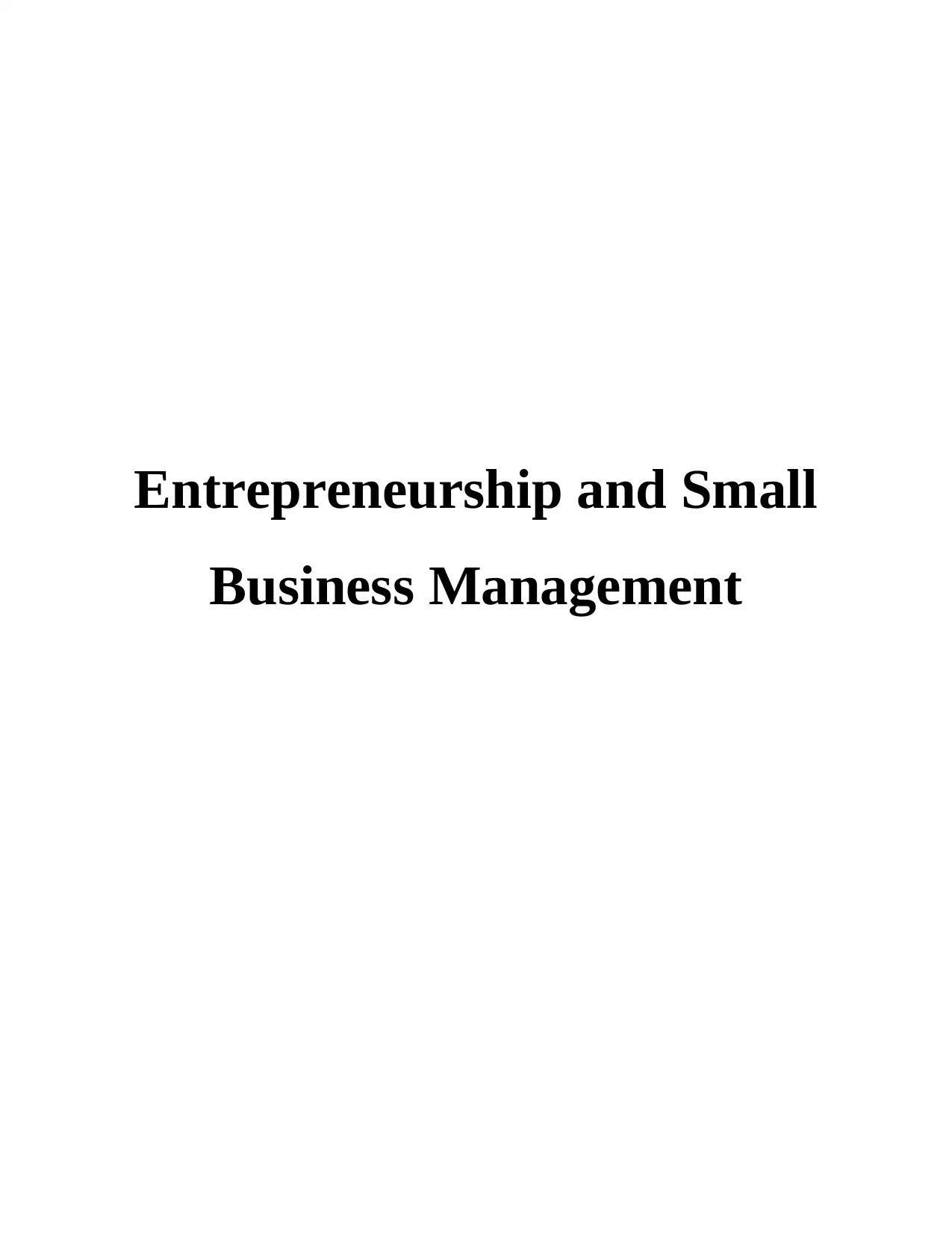
Entrepreneurship and Small
Business Management
Business Management
Paraphrase This Document
Need a fresh take? Get an instant paraphrase of this document with our AI Paraphraser
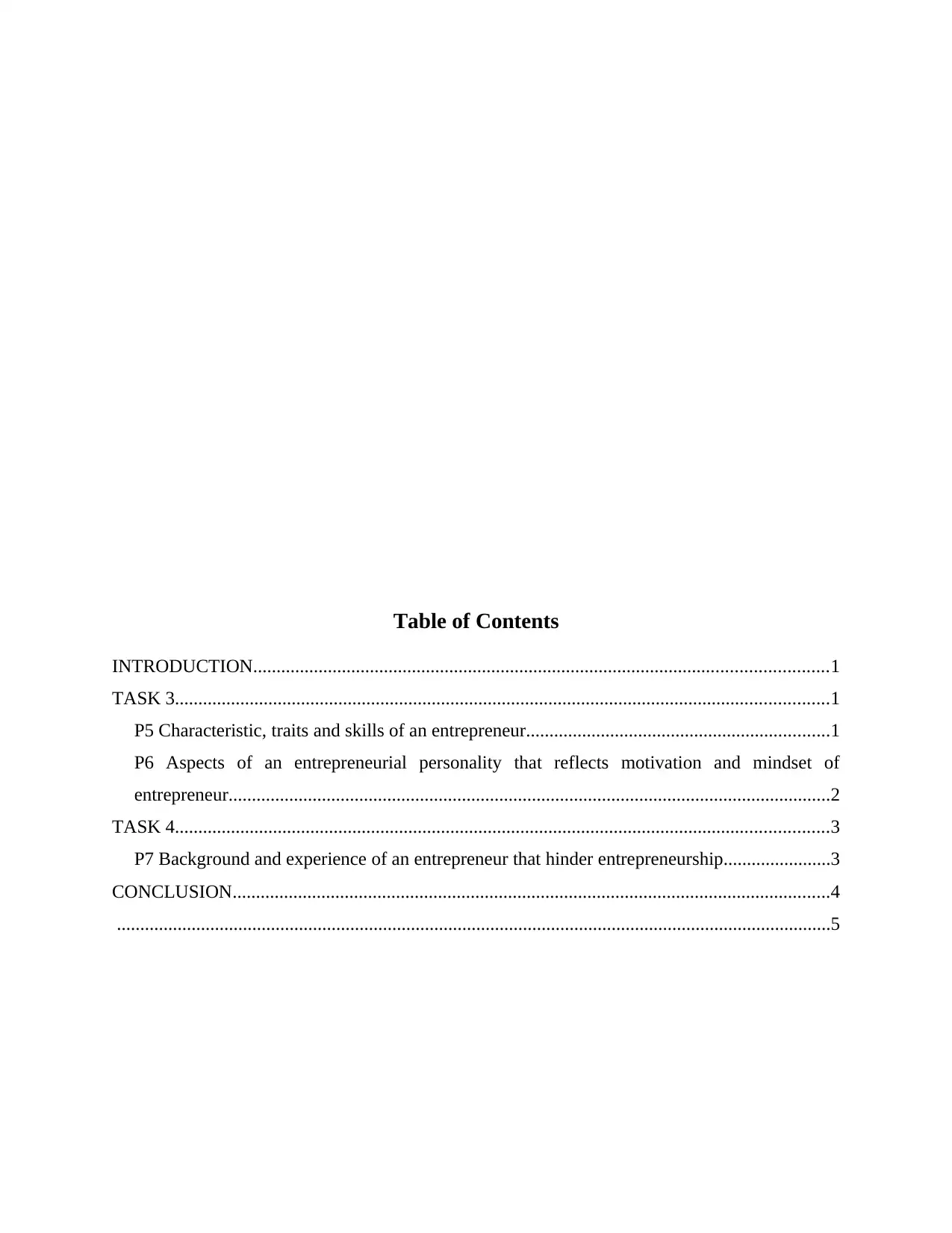
Table of Contents
INTRODUCTION...........................................................................................................................1
TASK 3............................................................................................................................................1
P5 Characteristic, traits and skills of an entrepreneur.................................................................1
P6 Aspects of an entrepreneurial personality that reflects motivation and mindset of
entrepreneur.................................................................................................................................2
TASK 4............................................................................................................................................3
P7 Background and experience of an entrepreneur that hinder entrepreneurship.......................3
CONCLUSION................................................................................................................................4
.........................................................................................................................................................5
INTRODUCTION...........................................................................................................................1
TASK 3............................................................................................................................................1
P5 Characteristic, traits and skills of an entrepreneur.................................................................1
P6 Aspects of an entrepreneurial personality that reflects motivation and mindset of
entrepreneur.................................................................................................................................2
TASK 4............................................................................................................................................3
P7 Background and experience of an entrepreneur that hinder entrepreneurship.......................3
CONCLUSION................................................................................................................................4
.........................................................................................................................................................5

⊘ This is a preview!⊘
Do you want full access?
Subscribe today to unlock all pages.

Trusted by 1+ million students worldwide
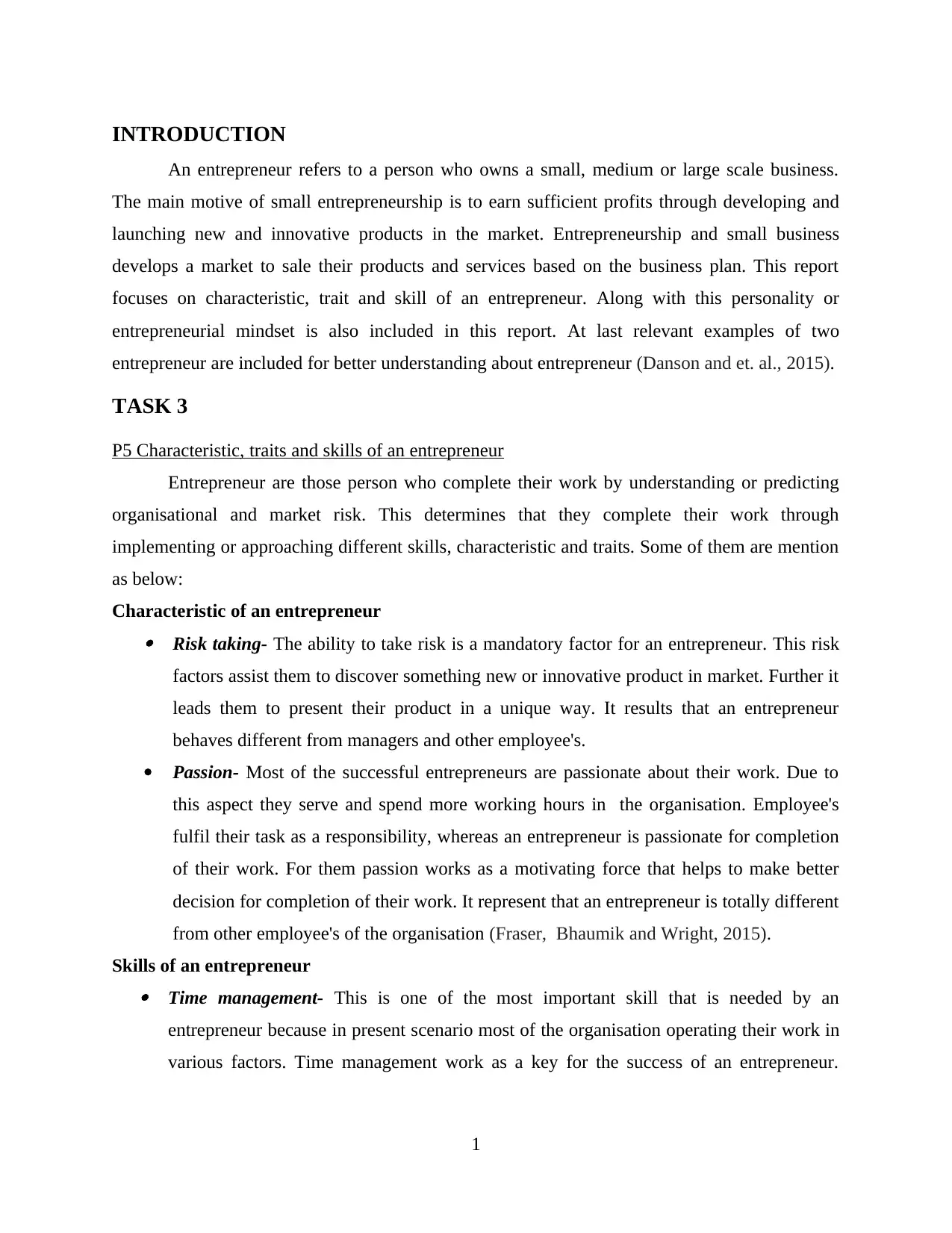
INTRODUCTION
An entrepreneur refers to a person who owns a small, medium or large scale business.
The main motive of small entrepreneurship is to earn sufficient profits through developing and
launching new and innovative products in the market. Entrepreneurship and small business
develops a market to sale their products and services based on the business plan. This report
focuses on characteristic, trait and skill of an entrepreneur. Along with this personality or
entrepreneurial mindset is also included in this report. At last relevant examples of two
entrepreneur are included for better understanding about entrepreneur (Danson and et. al., 2015).
TASK 3
P5 Characteristic, traits and skills of an entrepreneur
Entrepreneur are those person who complete their work by understanding or predicting
organisational and market risk. This determines that they complete their work through
implementing or approaching different skills, characteristic and traits. Some of them are mention
as below:
Characteristic of an entrepreneur Risk taking- The ability to take risk is a mandatory factor for an entrepreneur. This risk
factors assist them to discover something new or innovative product in market. Further it
leads them to present their product in a unique way. It results that an entrepreneur
behaves different from managers and other employee's.
Passion- Most of the successful entrepreneurs are passionate about their work. Due to
this aspect they serve and spend more working hours in the organisation. Employee's
fulfil their task as a responsibility, whereas an entrepreneur is passionate for completion
of their work. For them passion works as a motivating force that helps to make better
decision for completion of their work. It represent that an entrepreneur is totally different
from other employee's of the organisation (Fraser, Bhaumik and Wright, 2015).
Skills of an entrepreneur Time management- This is one of the most important skill that is needed by an
entrepreneur because in present scenario most of the organisation operating their work in
various factors. Time management work as a key for the success of an entrepreneur.
1
An entrepreneur refers to a person who owns a small, medium or large scale business.
The main motive of small entrepreneurship is to earn sufficient profits through developing and
launching new and innovative products in the market. Entrepreneurship and small business
develops a market to sale their products and services based on the business plan. This report
focuses on characteristic, trait and skill of an entrepreneur. Along with this personality or
entrepreneurial mindset is also included in this report. At last relevant examples of two
entrepreneur are included for better understanding about entrepreneur (Danson and et. al., 2015).
TASK 3
P5 Characteristic, traits and skills of an entrepreneur
Entrepreneur are those person who complete their work by understanding or predicting
organisational and market risk. This determines that they complete their work through
implementing or approaching different skills, characteristic and traits. Some of them are mention
as below:
Characteristic of an entrepreneur Risk taking- The ability to take risk is a mandatory factor for an entrepreneur. This risk
factors assist them to discover something new or innovative product in market. Further it
leads them to present their product in a unique way. It results that an entrepreneur
behaves different from managers and other employee's.
Passion- Most of the successful entrepreneurs are passionate about their work. Due to
this aspect they serve and spend more working hours in the organisation. Employee's
fulfil their task as a responsibility, whereas an entrepreneur is passionate for completion
of their work. For them passion works as a motivating force that helps to make better
decision for completion of their work. It represent that an entrepreneur is totally different
from other employee's of the organisation (Fraser, Bhaumik and Wright, 2015).
Skills of an entrepreneur Time management- This is one of the most important skill that is needed by an
entrepreneur because in present scenario most of the organisation operating their work in
various factors. Time management work as a key for the success of an entrepreneur.
1
Paraphrase This Document
Need a fresh take? Get an instant paraphrase of this document with our AI Paraphraser
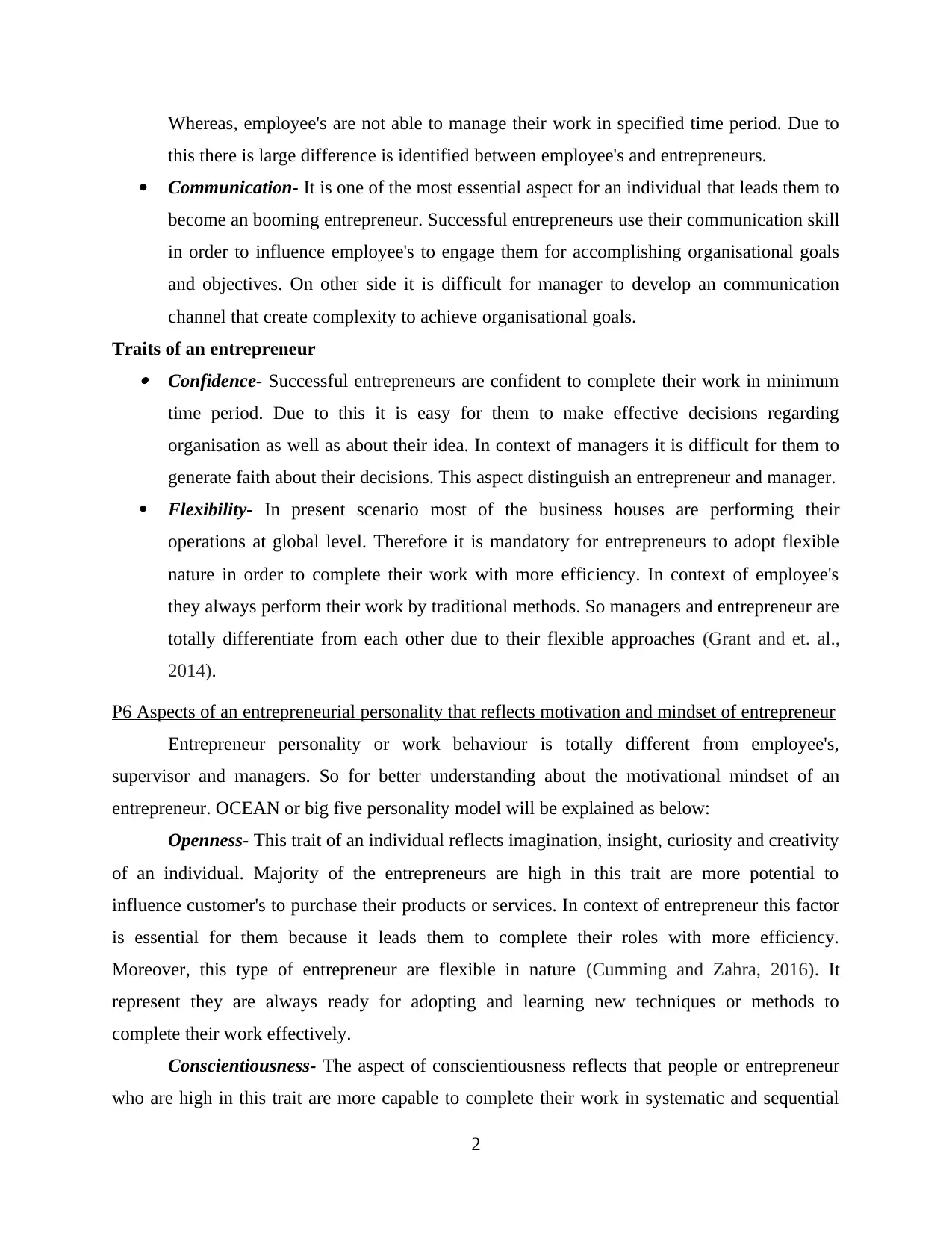
Whereas, employee's are not able to manage their work in specified time period. Due to
this there is large difference is identified between employee's and entrepreneurs.
Communication- It is one of the most essential aspect for an individual that leads them to
become an booming entrepreneur. Successful entrepreneurs use their communication skill
in order to influence employee's to engage them for accomplishing organisational goals
and objectives. On other side it is difficult for manager to develop an communication
channel that create complexity to achieve organisational goals.
Traits of an entrepreneur Confidence- Successful entrepreneurs are confident to complete their work in minimum
time period. Due to this it is easy for them to make effective decisions regarding
organisation as well as about their idea. In context of managers it is difficult for them to
generate faith about their decisions. This aspect distinguish an entrepreneur and manager.
Flexibility- In present scenario most of the business houses are performing their
operations at global level. Therefore it is mandatory for entrepreneurs to adopt flexible
nature in order to complete their work with more efficiency. In context of employee's
they always perform their work by traditional methods. So managers and entrepreneur are
totally differentiate from each other due to their flexible approaches (Grant and et. al.,
2014).
P6 Aspects of an entrepreneurial personality that reflects motivation and mindset of entrepreneur
Entrepreneur personality or work behaviour is totally different from employee's,
supervisor and managers. So for better understanding about the motivational mindset of an
entrepreneur. OCEAN or big five personality model will be explained as below:
Openness- This trait of an individual reflects imagination, insight, curiosity and creativity
of an individual. Majority of the entrepreneurs are high in this trait are more potential to
influence customer's to purchase their products or services. In context of entrepreneur this factor
is essential for them because it leads them to complete their roles with more efficiency.
Moreover, this type of entrepreneur are flexible in nature (Cumming and Zahra, 2016). It
represent they are always ready for adopting and learning new techniques or methods to
complete their work effectively.
Conscientiousness- The aspect of conscientiousness reflects that people or entrepreneur
who are high in this trait are more capable to complete their work in systematic and sequential
2
this there is large difference is identified between employee's and entrepreneurs.
Communication- It is one of the most essential aspect for an individual that leads them to
become an booming entrepreneur. Successful entrepreneurs use their communication skill
in order to influence employee's to engage them for accomplishing organisational goals
and objectives. On other side it is difficult for manager to develop an communication
channel that create complexity to achieve organisational goals.
Traits of an entrepreneur Confidence- Successful entrepreneurs are confident to complete their work in minimum
time period. Due to this it is easy for them to make effective decisions regarding
organisation as well as about their idea. In context of managers it is difficult for them to
generate faith about their decisions. This aspect distinguish an entrepreneur and manager.
Flexibility- In present scenario most of the business houses are performing their
operations at global level. Therefore it is mandatory for entrepreneurs to adopt flexible
nature in order to complete their work with more efficiency. In context of employee's
they always perform their work by traditional methods. So managers and entrepreneur are
totally differentiate from each other due to their flexible approaches (Grant and et. al.,
2014).
P6 Aspects of an entrepreneurial personality that reflects motivation and mindset of entrepreneur
Entrepreneur personality or work behaviour is totally different from employee's,
supervisor and managers. So for better understanding about the motivational mindset of an
entrepreneur. OCEAN or big five personality model will be explained as below:
Openness- This trait of an individual reflects imagination, insight, curiosity and creativity
of an individual. Majority of the entrepreneurs are high in this trait are more potential to
influence customer's to purchase their products or services. In context of entrepreneur this factor
is essential for them because it leads them to complete their roles with more efficiency.
Moreover, this type of entrepreneur are flexible in nature (Cumming and Zahra, 2016). It
represent they are always ready for adopting and learning new techniques or methods to
complete their work effectively.
Conscientiousness- The aspect of conscientiousness reflects that people or entrepreneur
who are high in this trait are more capable to complete their work in systematic and sequential
2

manner. For becoming an successful entrepreneur conscientiousness aspect must be high in an
individual. Due to this it is easy for them to manage and control their operations at global level.
Example- Individual with this aspect delegates time particularly for each task it leads them to
complete their essential task with more priority (Jones, 2014). On other side individuals with low
aspect are not able to complete their work in accurate manner due to mismanagement in
structure.
Extroversion- This aspect undertakes all factors that represent sociability, talkativeness,
excitability etc. of an individual. People who are high in this trait are able to engage more
number of individuals to perform a function with more efficiency. Entrepreneur with this aspect
easily handle social situations for completion of their work accurately. While individual with low
in this factor will face challenges to deal with people because of introvert behaviour.
Agreeableness- The personality dimension of agreeableness includes various factors such
as altruism, kindness, affection of an individual. In context of an entrepreneur this factor is
essential to be high because it emphasis an individual to become more cooperative for the
completion of project. This results organisation is able to complete their work in minimum time
period. This methods leads them to complete their work in minimum time period.
Emotional stability- Confidence, fear, anxiety and sensitive nature for completion of
through managing their work. Entrepreneur performs their work at global level so it is essential
for them to balance their emotional stability. This leads an individual to become an effective
entrepreneur which generates positivity in organisation. Moreover, due to high positivity in
organisation more productive results will be achieved by organisation.
TASK 4
P7 Background and experience of an entrepreneur that hinder entrepreneurship
Philip Green and Richard Branson are two successful entrepreneurs of UK which
operates their business at global level. Background and experience of them is mention as follow
that helps them to become a successful entrepreneur (Karatas‐Ozkan and et. al., 2014).
Background
Philip Green is a well-known British entrepreneur and currently the CEO of Arcadia
group. It is a combined corporation that operates various British retail stores such as British
home stores, Topshop etc. Green was born on 15 March 1952 and belongs to Jewish family. His
3
individual. Due to this it is easy for them to manage and control their operations at global level.
Example- Individual with this aspect delegates time particularly for each task it leads them to
complete their essential task with more priority (Jones, 2014). On other side individuals with low
aspect are not able to complete their work in accurate manner due to mismanagement in
structure.
Extroversion- This aspect undertakes all factors that represent sociability, talkativeness,
excitability etc. of an individual. People who are high in this trait are able to engage more
number of individuals to perform a function with more efficiency. Entrepreneur with this aspect
easily handle social situations for completion of their work accurately. While individual with low
in this factor will face challenges to deal with people because of introvert behaviour.
Agreeableness- The personality dimension of agreeableness includes various factors such
as altruism, kindness, affection of an individual. In context of an entrepreneur this factor is
essential to be high because it emphasis an individual to become more cooperative for the
completion of project. This results organisation is able to complete their work in minimum time
period. This methods leads them to complete their work in minimum time period.
Emotional stability- Confidence, fear, anxiety and sensitive nature for completion of
through managing their work. Entrepreneur performs their work at global level so it is essential
for them to balance their emotional stability. This leads an individual to become an effective
entrepreneur which generates positivity in organisation. Moreover, due to high positivity in
organisation more productive results will be achieved by organisation.
TASK 4
P7 Background and experience of an entrepreneur that hinder entrepreneurship
Philip Green and Richard Branson are two successful entrepreneurs of UK which
operates their business at global level. Background and experience of them is mention as follow
that helps them to become a successful entrepreneur (Karatas‐Ozkan and et. al., 2014).
Background
Philip Green is a well-known British entrepreneur and currently the CEO of Arcadia
group. It is a combined corporation that operates various British retail stores such as British
home stores, Topshop etc. Green was born on 15 March 1952 and belongs to Jewish family. His
3
⊘ This is a preview!⊘
Do you want full access?
Subscribe today to unlock all pages.

Trusted by 1+ million students worldwide
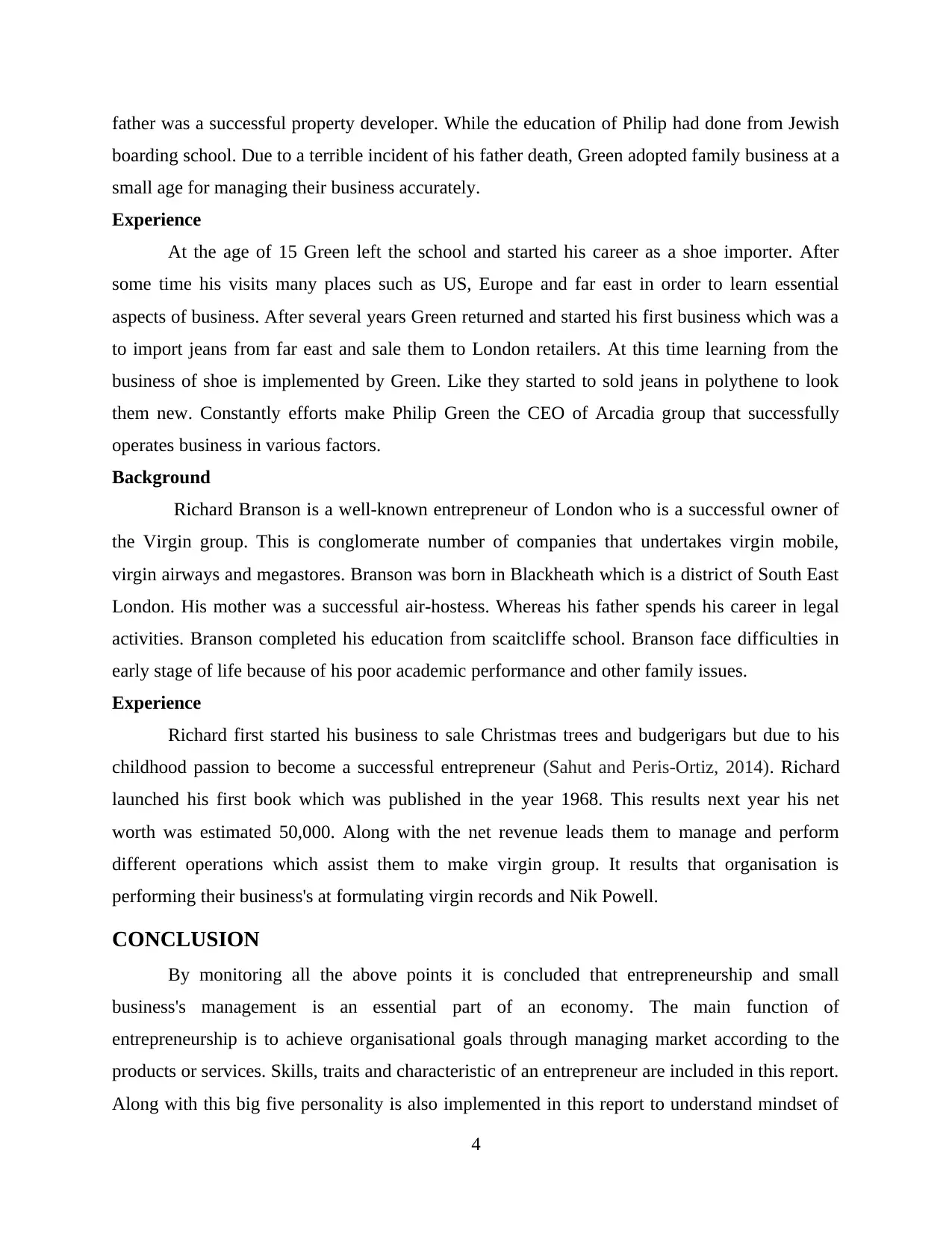
father was a successful property developer. While the education of Philip had done from Jewish
boarding school. Due to a terrible incident of his father death, Green adopted family business at a
small age for managing their business accurately.
Experience
At the age of 15 Green left the school and started his career as a shoe importer. After
some time his visits many places such as US, Europe and far east in order to learn essential
aspects of business. After several years Green returned and started his first business which was a
to import jeans from far east and sale them to London retailers. At this time learning from the
business of shoe is implemented by Green. Like they started to sold jeans in polythene to look
them new. Constantly efforts make Philip Green the CEO of Arcadia group that successfully
operates business in various factors.
Background
Richard Branson is a well-known entrepreneur of London who is a successful owner of
the Virgin group. This is conglomerate number of companies that undertakes virgin mobile,
virgin airways and megastores. Branson was born in Blackheath which is a district of South East
London. His mother was a successful air-hostess. Whereas his father spends his career in legal
activities. Branson completed his education from scaitcliffe school. Branson face difficulties in
early stage of life because of his poor academic performance and other family issues.
Experience
Richard first started his business to sale Christmas trees and budgerigars but due to his
childhood passion to become a successful entrepreneur (Sahut and Peris-Ortiz, 2014). Richard
launched his first book which was published in the year 1968. This results next year his net
worth was estimated 50,000. Along with the net revenue leads them to manage and perform
different operations which assist them to make virgin group. It results that organisation is
performing their business's at formulating virgin records and Nik Powell.
CONCLUSION
By monitoring all the above points it is concluded that entrepreneurship and small
business's management is an essential part of an economy. The main function of
entrepreneurship is to achieve organisational goals through managing market according to the
products or services. Skills, traits and characteristic of an entrepreneur are included in this report.
Along with this big five personality is also implemented in this report to understand mindset of
4
boarding school. Due to a terrible incident of his father death, Green adopted family business at a
small age for managing their business accurately.
Experience
At the age of 15 Green left the school and started his career as a shoe importer. After
some time his visits many places such as US, Europe and far east in order to learn essential
aspects of business. After several years Green returned and started his first business which was a
to import jeans from far east and sale them to London retailers. At this time learning from the
business of shoe is implemented by Green. Like they started to sold jeans in polythene to look
them new. Constantly efforts make Philip Green the CEO of Arcadia group that successfully
operates business in various factors.
Background
Richard Branson is a well-known entrepreneur of London who is a successful owner of
the Virgin group. This is conglomerate number of companies that undertakes virgin mobile,
virgin airways and megastores. Branson was born in Blackheath which is a district of South East
London. His mother was a successful air-hostess. Whereas his father spends his career in legal
activities. Branson completed his education from scaitcliffe school. Branson face difficulties in
early stage of life because of his poor academic performance and other family issues.
Experience
Richard first started his business to sale Christmas trees and budgerigars but due to his
childhood passion to become a successful entrepreneur (Sahut and Peris-Ortiz, 2014). Richard
launched his first book which was published in the year 1968. This results next year his net
worth was estimated 50,000. Along with the net revenue leads them to manage and perform
different operations which assist them to make virgin group. It results that organisation is
performing their business's at formulating virgin records and Nik Powell.
CONCLUSION
By monitoring all the above points it is concluded that entrepreneurship and small
business's management is an essential part of an economy. The main function of
entrepreneurship is to achieve organisational goals through managing market according to the
products or services. Skills, traits and characteristic of an entrepreneur are included in this report.
Along with this big five personality is also implemented in this report to understand mindset of
4
Paraphrase This Document
Need a fresh take? Get an instant paraphrase of this document with our AI Paraphraser
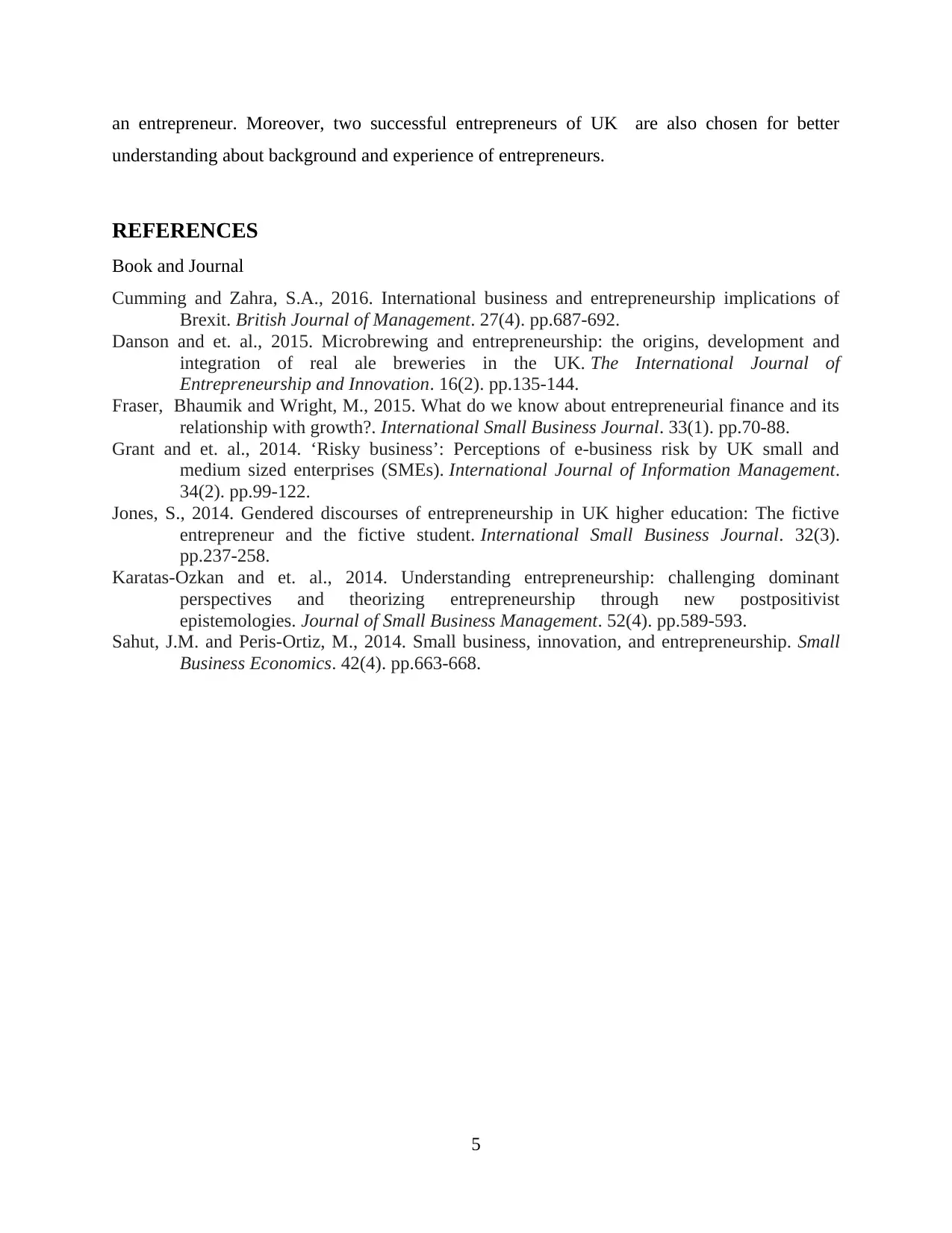
an entrepreneur. Moreover, two successful entrepreneurs of UK are also chosen for better
understanding about background and experience of entrepreneurs.
REFERENCES
Book and Journal
Cumming and Zahra, S.A., 2016. International business and entrepreneurship implications of
Brexit. British Journal of Management. 27(4). pp.687-692.
Danson and et. al., 2015. Microbrewing and entrepreneurship: the origins, development and
integration of real ale breweries in the UK. The International Journal of
Entrepreneurship and Innovation. 16(2). pp.135-144.
Fraser, Bhaumik and Wright, M., 2015. What do we know about entrepreneurial finance and its
relationship with growth?. International Small Business Journal. 33(1). pp.70-88.
Grant and et. al., 2014. ‘Risky business’: Perceptions of e-business risk by UK small and
medium sized enterprises (SMEs). International Journal of Information Management.
34(2). pp.99-122.
Jones, S., 2014. Gendered discourses of entrepreneurship in UK higher education: The fictive
entrepreneur and the fictive student. International Small Business Journal. 32(3).
pp.237-258.
Karatas‐Ozkan and et. al., 2014. Understanding entrepreneurship: challenging dominant
perspectives and theorizing entrepreneurship through new postpositivist
epistemologies. Journal of Small Business Management. 52(4). pp.589-593.
Sahut, J.M. and Peris-Ortiz, M., 2014. Small business, innovation, and entrepreneurship. Small
Business Economics. 42(4). pp.663-668.
5
understanding about background and experience of entrepreneurs.
REFERENCES
Book and Journal
Cumming and Zahra, S.A., 2016. International business and entrepreneurship implications of
Brexit. British Journal of Management. 27(4). pp.687-692.
Danson and et. al., 2015. Microbrewing and entrepreneurship: the origins, development and
integration of real ale breweries in the UK. The International Journal of
Entrepreneurship and Innovation. 16(2). pp.135-144.
Fraser, Bhaumik and Wright, M., 2015. What do we know about entrepreneurial finance and its
relationship with growth?. International Small Business Journal. 33(1). pp.70-88.
Grant and et. al., 2014. ‘Risky business’: Perceptions of e-business risk by UK small and
medium sized enterprises (SMEs). International Journal of Information Management.
34(2). pp.99-122.
Jones, S., 2014. Gendered discourses of entrepreneurship in UK higher education: The fictive
entrepreneur and the fictive student. International Small Business Journal. 32(3).
pp.237-258.
Karatas‐Ozkan and et. al., 2014. Understanding entrepreneurship: challenging dominant
perspectives and theorizing entrepreneurship through new postpositivist
epistemologies. Journal of Small Business Management. 52(4). pp.589-593.
Sahut, J.M. and Peris-Ortiz, M., 2014. Small business, innovation, and entrepreneurship. Small
Business Economics. 42(4). pp.663-668.
5
1 out of 8
Related Documents
Your All-in-One AI-Powered Toolkit for Academic Success.
+13062052269
info@desklib.com
Available 24*7 on WhatsApp / Email
![[object Object]](/_next/static/media/star-bottom.7253800d.svg)
Unlock your academic potential
Copyright © 2020–2025 A2Z Services. All Rights Reserved. Developed and managed by ZUCOL.




